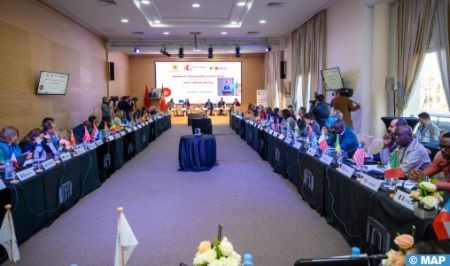Euro-African Dialogue on Migration and Development: Moroccan Presidency’s Rich Contribution Highly Commended
The rich contribution of the Moroccan presidency of the Euro-African Dialogue on Migration and Development (Rabat Process) was highly commended, Thursday in Rabat, by European and African officials, on the occasion of the Senior Officials’ Meeting (SOM). Speaking at the opening of the meeting, Fouad Kadmiri, Director of Consular and Social Affairs at the Ministry of Foreign Affairs, African Cooperation and Moroccan Expatriates, stressed that thanks to the involvement of all Rabat Process partner countries, the Moroccan Presidency had succeeded in implementing a rich program of thematic meetings, maintaining a delicate balance between the five pillars of the Euro-African Dialogue on Migration and Development. He added that the Moroccan presidency of the Rabat Process aimed to encourage mobility and regular migration, as vectors of co-development and an effective means of counteracting irregular migration, and to promote the principles of shared responsibility and solidarity within regional partnerships for global governance of migration. Another objective of this presidency was to support the valorization of the diasporas’ contribution to the development of host countries and their contribution to the socio-economic development of countries of origin, and to promote economic inclusion to limit the impacts of climate change and encourage return and reintegration. For her part, Portugal’s Secretary of State for Equality and Migration, Isabel Almeida Rodrigues, welcomed Morocco’s organization of this meeting, which aims to examine the prospects and opportunities linked to circular migration, stressing the importance of joining efforts to promote legal migration. She also expressed her country’s commitment to adopting the Cadiz Agenda 2023-2027, launched in 2022, with a view to developing migration policies, calling for open dialogue between authorities on technical and political issues linked to migration and development. Almeida Rodrigues also emphasized the need for joint action and intensified efforts to meet today’s migration challenges. She stressed the importance of facilitating labor mobility, developing skills and integrating migrant workers. For his part, Albert Siaw-Boateng, Director of Free Movement of Persons and Migration at the Economic Community of West African States (ECOWAS) Commission, praised the role played by Morocco during its presidency of the Rabat Process in favor of Atlantic African countries, with the aim of consolidating peace, stability and shared prosperity among African countries overlooking the Atlantic Ocean. In this respect, he hailed the achievements made during this presidency. Siaw-Boateng also underlined the importance of this meeting as a platform for exchanging experiences and unifying initiatives to optimize the benefits of circular migration, while ensuring that its challenges are effectively met, considering that the management of migratory flows is an urgent necessity and a shared responsibility. Speaking at the event, Daniele Dotto, Deputy Head of the European Union Delegation in Morocco, said that cooperation with Morocco represents “a very good example” of close cooperation covering all aspects of migration, including border protection, the fight against traffickers and the introduction of more legal migration initiatives in various sectors. The European Commission is developing, in close cooperation with member states, “talent partnerships” to support legal migration, said Dotto, adding that Morocco is among the priority countries with which these initiatives have been launched, the aim being to create a positive dynamic that can benefit countries of origin, migrants and destination countries. For her part, Sedef Dearing, Director of Migration Dialogues and Cooperation at the International Centre for Migration Policy Development, praised the Moroccan approach, which makes migration a vector for development by creating a number of socio-economic opportunities, and promotes regular migration through a program rich in activities and initiatives.

